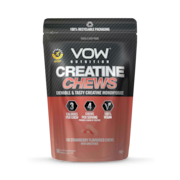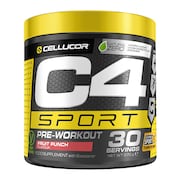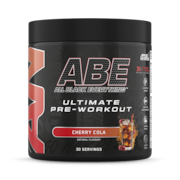15% off €25
Code:SPEND
The best vegan creatine supplements to power your workout

Navigating sports nutrition as a vegan athlete can be tricky. Learn why creatine is important and get our top recommendations for vegan creatine supplements
Our top picks
Strawberry

Vow Nutrition
Vow Nutrition Creatine Chews Strawberry 100 Chews
Save up to 1/2 price
18+
€20.00
€26.00
Fruit punch

Cellucor
Cellucor C4 Sport Pre-Workout Fruit Punch 270g
Save up to 1/2 price
18+
€24.00
€30.00
Cherry cola

Applied Nutrition
Applied Nutrition ABE Ultimate Pre Workout Cherry Cola 375g
Save up to 1/2 price
18+
€27.00
€39.00
Navigating the landscape of sports nutrition presents unique challenges for vegans, who must carefully select sports supplements aligned with their dietary principles. Luckily, creatine – a highly popular and effective sports supplement – is vegan.1
Creatine monohydrate is a widely studied natural supplement renowned, in a few small studies, for potentially improving athletic performance, muscle mass and strength as well as post-exercise recovery.2-4
In this article, we’ll explore the potential benefits of creatine supplementation, discuss why it’s so important for vegans and give our top four picks for the best vegan creatine supplements on the market.
What is creatine?
Creatine is a naturally occurring compound made up of three amino acids – glycine, arginine and methionine.5
It’s made in small amounts in the body by our liver, kidneys and pancreas.5,6 About 95% of creatine is thought to be stored in our muscles, but small amounts are also stored in other tissues, including the heart, brain and testes.5
Creatine can play an essential role in the synthesis (production) of adenosine triphosphate (ATP), which powers all cellular processes, including muscle contraction. According to a few studies, more ATP in our muscles means more energy for high-intensity exercises.2,3,7
While creatine is naturally found in red meat, seafood and dairy, it can also be manufactured as a supplement – good news for those following a vegan diet.8
There are many different types of creatine, but the most popular and widely studied type is creatine monohydrate.9
Possible benefits of creatine
Creatine monohydrate supplementation has been widely studied and has gained a highly regarded reputation in current literature as a safe and effective method for its possible effects in enhancing physical performance in sports.2
Some of the reported potential benefits of creatine may include:
- may improve exercise performance – some researchers believe creatine supplementation may promote faster regeneration of ATP, meaning your muscles have more energy to train harder during your workout2,3,7,10
- may lead to faster muscle recovery – emerging research shows creatine may improve training recovery by mitigating muscle damage during intense training sessions, and reducing inflammation and soreness post-exercise2,11-13
- may increase muscle mass – when combined with resistance training, creatine supplementation has been consistently reported to help people achieve greater muscle gains 2,14,15
- may improve cognitive function – there’s some evidence to suggest that creatine supplementation may also improve cognitive function, including short-term memory and reasoning.16-18 However, more research is needed19-21
Due to its reputation for helping users achieve short bursts of speed and energy, athletes commonly use creatine to enhance sports activities, such as weightlifting, cycling and sprinting.2-4,22
Potential side effects of creatine
No medically significant side effects have been reported from creatine supplementation despite widespread use but a medical professional should always be consulted before its use.3,4,9

Weight gain (as a result of water retention and decreased urine output) has been found in some studies to be the most common side effect.3,9 Other possible side effects of creatine supplementation can include digestive problems such as stomach cramps, nausea and diarrhoea.3
Find out more about the potential side effects of creatine in our guide.
Can vegans use creatine?
Since meat and dairy are off the menu, you may wonder if there are any plant-based sources of creatine.
Unfortunately, creatine isn’t found in any plant-based foods in considerable amounts, so increasing your creatine intake through diet alone isn’t possible. However, if you’re vegan, you can eat other foods rich in amino acids (such as nuts and seeds, tofu and quinoa) that your body can convert to creatine.5,6,8
And the good news is that plenty of vegan creatine supplements are available to fill the gap too.
In fact, the majority of creatine supplements are made without using any animal products – by heating and cooling sarcosine and cyanamide, which are naturally vegan.22
You can buy creatine supplements in various formats to suit your tastes, preferences and budget.
Vegan creatine supplements include:
- pre-workout powders with creatine
- pure creatine powder
- creatine chews
It’s important to note that creatine capsules are often made using gelatine, which makes them unsuitable for vegans. When in doubt, check the label.
Do vegan athletes need creatine?
Your body produces approximately 1g of creatine a day, roughly half of what it needs.23,24 Depending on your body type, diet and fitness regime, research suggests you may need to ingest another 2‒3g of creatine per day to maintain normal creatine stores.5
A few studies have shown that levels of blood creatine concentration and intramuscular (within the muscles) creatine levels may be lower in those who follow a vegetarian diet than in meat eaters.25,26 Limited research has shown that people with low levels of intramuscular creatine may be more responsive to creatine supplementation, but the evidence isn’t conclusive.27
Creatine supplementation can benefit both vegan and non-vegan athletes due to its essential role in increasing energy production during high-intensity exercise. However, as current research suggests, if you follow a vegan or vegetarian diet, boosting your body’s natural stores of creatine through supplementation is particularly important, since you can’t increase your dietary intake of the compound.22
Our recommendations for our top vegan creatine supplements
This sweet pre-workout formula contains electrolytes, creatine, beta-alanine, caffeine, taurine and arginine AKG.29 It’s the perfect combo of sports drink and pre-workout supplementation to fuel your high-intensity sessions.
How to use:29
- take at least 30 minutes before exercising
- mix with water – no blender required
- contains 3409mg of creatine per 9g serving29
- perfectly mixes performance and energy support in one drink for body support29
- every batch tested for banned substances29
This pre-workout supplement contains creatine, citrulline, beta-alanine, theacrine, vitamin B3 and vitamin B12.30
How to use:30
- mix with water at least 15 minutes before exercise
- contains 3.25g of creatine30
- contains niacin (vitamin B3), which may help reduce tiredness and fatigue,30,31,32
- with added vitamin B12 to support normal red blood cell formation31,33
- available in nine flavours
If you struggle with liquid or tablet supplements, these creatine monohydrate strawberry chews are highly convenient for use on the go or when travelling.
How to use:34
- consume a minimum of 4 chews (providing 3g of creatine) or up to 6 chews daily (providing 5g of creatine)
- control the dosage depending on your needs34
- increase your performance on the go34
- excellent alternative to powders if you don’t care for the taste or texture of creatine34
The final say
Although your body naturally produces creatine, you may not be creating enough of this vital compound for your needs if you’re vegan or you lead an active or athletic lifestyle.2,5,23 Many athletes supplement with creatine to enhance their performance and power their high-intensity workouts.1,2,5
Vegans often have lower baseline levels of creatine in their body due to a lack of dietary intake, meaning supplementation might be helpful for gym-goers.25,26 Luckily, there are many vegan creatine supplements available to give your training regime an added boost.
The advice in this article is for information only and shouldn’t replace medical care. While we strive for accuracy and balance, please be aware that this article may discuss products available for purchase through Holland & Barrett. Please check with your GP or healthcare professional before trying any supplements, treatments or remedies. Food supplements mustn’t be used as a substitute for a varied and balanced diet and a healthy lifestyle.
1. Kaviani M, et al. Benefits of creatine supplementation for vegetarians compared to omnivorous athletes: A systematic review. Int J Environ Res Public Health. 2020;17(9):3041. DOI: https://doi.org/10.3390/ijerph17093041.
2. Kreider RB, et al. International Society of Sports Nutrition position stand: Safety and efficacy of creatine supplementation in exercise, sport, and medicine. J Int Soc Sports Nutr. 2017;14(1). DOI: https://doi.org/10.1186/s12970-017-0173-z.
3. Hall M, Manetta E, Tupper K. Creatine supplementation: An update. Curr Sports Med Rep. 2021;20(7):338–44. DOI: https://doi.org/10.1249/JSR.0000000000000863.
4. Hall M, Trojian TH. Creatine supplementation. Curr Sports Med Rep. 2013;12(4):240–4. DOI: https://doi.org/10.1249/JSR.0b013e31829cdff2.
5. Kreider RB, Stout JR. Creatine in health and disease. Nutrients. 2021;13(2):447. DOI: https://doi.org/10.3390/nu13020447.
6. Bonilla DA, et al. Metabolic basis of creatine in health and disease: A bioinformatics-assisted review. Nutrients. 2021;13(4):1238. DOI: https://doi.org/10.3390/nu13041238.
7. Saito S, et al. Creatine supplementation enhances immunological function of neutrophils by increasing cellular adenosine triphosphate. Biosci Microbiota Food Health. 2022;41(4):185–94. DOI: https://doi.org/10.12938/bmfh.2022-018.
8. Vulturar R, et al. Creatine supplementation and muscles: From metabolism to medical practice. Ro J Med Pract. 2021;16(3):317–21.DOI: https://doi.org/10.37897/RJMP.2021.3.4.
9. Jäger R, et al. Analysis of the efficacy, safety, and regulatory status of novel forms of creatine. Amino Acids. 2011;40(5):1369–83. DOI: https://doi.org/10.1007/s00726-011-0874-6.
10. Kurosawa Y, et al. Creatine supplementation enhances anaerobic ATP synthesis during a single 10 sec maximal handgrip exercise. Mol Cell Biochem. 2003;244(1/2):105–12. DOI: https://doi.org/10.1023/A:1022421404367.
11. Wax B, et al. Creatine for exercise and sports performance, with recovery considerations for healthy populations. Nutrients. 2021;13(6):1915. DOI: https://doi.org/10.3390/nu13061915.
12. Doma K, et al. The paradoxical effect of creatine monohydrate on muscle damage markers: A systematic review and meta-analysis. Sports Med. 2022;52:1623–1645. DOI: https://doi.org/10.1007/s40279-022-01640-z.
13. Jiaming Y, Rahimi MH. Creatine supplementation effect on recovery following exercise‐induced muscle damage: A systematic review and meta‐analysis of randomized controlled trials. J Food Biochem. 2021;45(10):e13916. DOI: https://doi.org/10.1111/jfbc.13916.
14. Almeida D, et al. Creatine supplementation improves physical performance, without negative effects on health markers, in young weightlifters. JSci Sport Exerc. 2022;4(3):255–265. DOI: https://doi.org/10.1007/s42978-021-00147-9.
15. Wu SH, et al. Creatine supplementation for muscle growth: A scoping review of randomized clinical trials from 2012 to 2021. Nutrients. 2022;14(6):1255. DOI: https://doi.org/10.3390/nu14061255.
16. Dolan E, et al. Beyond muscle: The effects of creatine supplementation on brain creatine, cognitive processing, and traumatic brain injury. Eur J Sport Sci. 2018;19(1):1–14. DOI: https://doi.org/10.1080/17461391.2018.1500644.
17. Avgerinos KI, et al. Effects of creatine supplementation on cognitive function of healthy individuals: A systematic review of randomized controlled trials. Exp Gerontol. 2018;108:166–73. DOI: https://doi.org/10.1016/j.exger.2018.04.013.
18. Benton D, Donohoe R. The influence of creatine supplementation on the cognitive functioning of vegetarians and omnivores. Br J Nutr. 2011;105(7):1100–5. DOI: https://doi.org/10.1017/S0007114510004733.
19. Rawson ES, Venezia AC. Use of creatine in the elderly and evidence for effects on cognitive function in young and old. Amino Acids. 2011;40(5):1349–62. DOI: https://doi.org/10.1007/s00726-011-0855-9.
20. McMorris T, et al. Creatine supplementation and cognitive performance in elderly individuals. Aging Neuropsychol Cogn. 2007;14(5):517–28. DOI: https://doi.org/10.1080/13825580600788100.
21. Candow DG, et al. “Heads up” for creatine supplementation and its potential applications for brain health and function. Sports Med. 2023;53:49–65. DOI: https://doi.org/10.1007/s40279-023-01870-9.
22. Butts J, et al. Creatine use in sports. Sports Health. 2018;10(1):31–4. DOI: https://doi.org/10.1177/1941738117737248.
23. Cooper R, et al. Creatine supplementation with specific view to exercise/sports performance: An update. J Int Soc Sports Nutr. 2012;9(1):33. DOI: https://doi.org/10.1186/1550-2783-9-33.
24. Brosnan ME, Brosnan JT. The role of dietary creatine. Amino Acids. 2016;48(8):1785–91. DOI: https://doi.org/10.1007/s00726-016-2188-1.
25. Delanghe J, et al. Normal reference values for creatine, creatinine, and carnitine are lower in vegetarians. Clin Chem. 1989;35(8):1802–3. DOI: https://doi.org/10.1093/clinchem/35.8.1802.
26. Blancquaert L, et al. Changing to a vegetarian diet reduces the body creatine pool in omnivorous women, but appears not to affect carnitine and carnosine homeostasis: a randomised trial. Br J Nutr. 2018;119(7):759–70. DOI: https://doi.org/10.1017/S000711451800017X.
27. Burke DG, et al. Effect of creatine and weight training on muscle creatine and performance in vegetarians. Med Sci Sports Exerc. 2003;35(11):1946–55. DOI: https://doi.org/10.1249/01.MSS.0000093614.17517.79.
28. foodspring. Creatine Powder. [Internet]. [cited 2024 Jul 3]. Available from: https://www.foodspring.co.uk/creatine-powder
29. Holland & Barrett. Cellucor C4 Sport Pre-Workout Fruit Punch. [Internet]. [cited 2024 Jul 3]. Available from: https://www.hollandandbarrett.com/shop/product/cellucor-c4-sport-pre-workout-fruit-punch-60007040
30. Applied Nutrition Ltd. ABE All Black Everything - Extremely Potent Pre-Workout Powder. [Internet]. [cited 2024 Jul 3]. Available from: https://appliednutrition.uk/products/abe-all-black-everything-375g
31. Tardy AL, et al. Vitamins and minerals for energy, fatigue and cognition: A narrative review of the biochemical and clinical evidence. Nutrients. 2020;12(1):228. DOI: https://doi.org/10.3390/nu12010228.
32. Scientific Opinion on the substantiation of health claims related to niacin and reduction of tiredness and fatigue (ID 47), contribution to normal energy-yielding metabolism (ID 51), contribution to normal psychological functions (ID 55), maintenance of n. EFSA Journal. 2010;8(10):1757. DOI: https://doi.org/10.2903/j.efsa.2010.1757.
33. Krzywański J, et al. Vitamin B12 status and optimal range for hemoglobin formation in elite athletes. Nutrients. 2020;12(4):1038. DOI: https://doi.org/10.3390/nu12041038.
34. VOW Nutrition. VOW Creatine Chews | Creatine Monohydrate. [Internet]. [cited 2024 Jul 3]. Available from: https://vownutrition.com/products/vow-creatine-chews?variant=32226601009236







